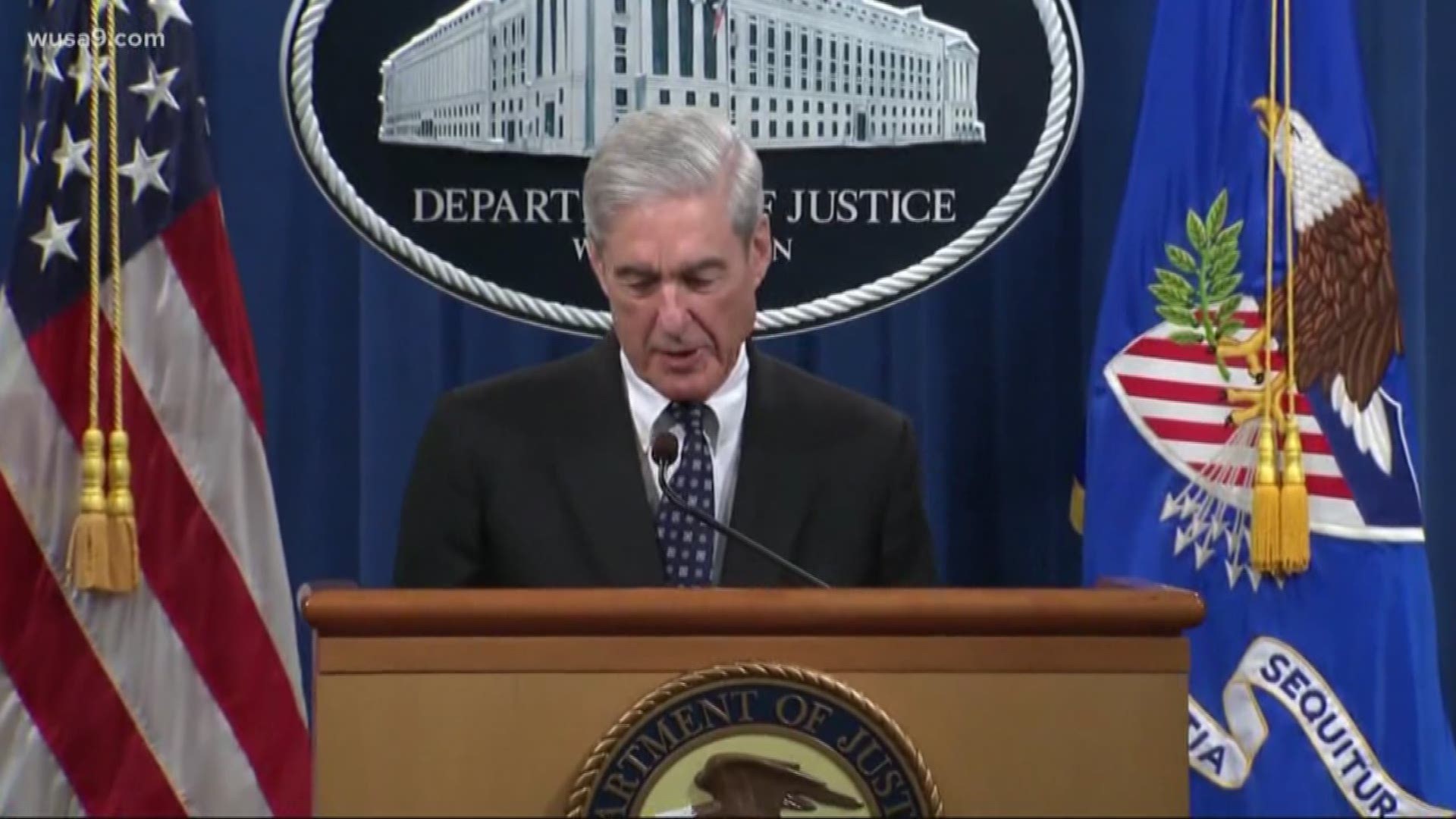He won't watch. Well, maybe just a little bit.
President Donald Trump on Monday feigned indifference to Robert Mueller's upcoming congressional testimony, an eyebrow-raising claim for a media-obsessed president who has been concerned for months about the potential impact of the former special counsel's appearance.
Much of Washington will stop in its tracks Wednesday as Mueller testifies on Capitol Hill for at least five hours, a nationally televised event that for many Americans will be their first detailed exposure to the former special counsel's findings on Russia's 2016 election interference.
"No, I'm not going to be watching — probably — maybe I'll see a little bit of it," Trump told reporters in the Oval Office. "I'm not going to be watching Mueller because you can't take all those bites out of the apple."
That was a shift from Friday, when Trump insisted that he would not watch any of Mueller's back-to-back appearances before two House committees.
Either way, the president has continued to wage war on the former special counsel's credibility, sending out a series of tweets Monday in which he deemed Mueller, without evidence, "highly conflicted" and said that "in the end it will be bad for him and the phony Democrats in Congress who have done nothing but waste time on this ridiculous Witch Hunt."
Trump's Twitter account may well be the main vehicle for the White House to respond to Mueller's testimony.
Though the probe did not establish charges of criminal conspiracy or obstruction, there has been growing concern among those close to the president that Mueller's appearance could push undecided or reluctant Democrats toward impeachment. Even so, there appears to be little evidence of an organized White House response plan to the hearings.
The president has a light schedule Wednesday morning, when Mueller begins speaking, before heading to West Virginia for evening fundraisers. The TVs aboard Air Force One are likely to be tuned to coverage of the hearings, and the president is expected to watch or be briefed on most of the proceedings, according to four administration officials and Republicans close to the White House. They spoke on condition of anonymity because they were not authorized to discuss internal plans.
When Mueller was originally scheduled to appear last Wednesday, before a one-week postponement, the president's campaign scheduled a rally that night in North Carolina so Trump could offer a rebuttal. That won't happen this time, though the president's personal attorneys, including Rudy Giuliani, may issue their own statements, and talking points could be circulated among conservatives.
There is also an expectation within the White House that House Republicans will pepper Mueller with tough questions, though they may be less comfortable taking a swipe at the decorated war hero from the chambers rather than via Twitter or Fox News.
White House press secretary Stephanie Grisham has yet to make an on-camera appearance after nearly a month in the job. But Kellyanne Conway, senior counselor to the president, previewed the attack lines Monday.
"Well, I want the taxpayers to see the way the Democratic Congress is spending their money day in and day out. A do-over of the do-over of the do-over," Conway said on Fox News. "Now they want Bob Mueller, they want to drag him before Congress and have him read out loud. Bob Mueller book on tape, courtesy of the taxpayer, I don't think so. They also think you're stupid, America, that you can't read the report for yourself."
The nation has heard the special counsel speak only once — for nine minutes — since his appointment in May 2017.
This time, the House Judiciary Committee and the House Intelligence Committee will question Mueller in separate hearings on the report.
Mueller plans to begin with an opening statement that a spokesman said would be similar in substance to his May 29 statement from the Justice Department podium. In that statement, he cautioned Congress that he would not go beyond the text of the report if called upon to testify and explained his team's decision to neither seek an indictment of the president nor exonerate him on obstruction of justice allegations.
While the report did not find sufficient evidence to establish charges of criminal conspiracy between the Trump campaign and Russia to swing the election, it said Trump could not be cleared of trying to obstruct the investigation.
Because the report was dense and, at times, lawyerly, Trump allies have long fretted that while few lawmakers and Americans read the report, they might be swayed by Mueller's in-person testimony.
The president has spent months concerned about the prospect of the media coverage that would be given to Mueller, who Trump believes has been unfairly lionized across cable news and the front pages of the nation's leading newspapers for two years, according to three White House officials and Republicans close to the White House.
Before the report's release, Trump had feared a repeat — but bigger — of the February testimony of his former lawyer and fixer, Michael Cohen, which dominated news coverage and even overshadowed his nuclear summit with North Korean leader Kim Jong Un in Vietnam.
That worry has faded some in recent weeks. White House officials believe that the public has grown tired of the Russia story line and is growing more convinced that it has been propped up by Democrats and media figures frustrated that Mueller didn't topple the administration.
___
Associated Press writers Eric Tucker and Deb Riechmann contributed to this report from Washington.

